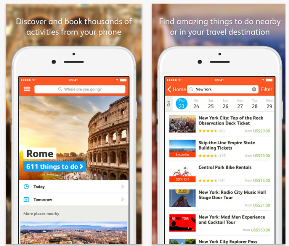Travel Industry Start-ups – Lessons from GetYourGuide
By David Eddy on Nov 19, 2015 7:00:00 AM

GetYourGuide, a young travel company founded in 2009, made a splash in travel industry news last week with the announcement of a $50 million investment by KKR, a prominent NYC-based investment company. For new travel company entrepreneurs – or those in any industry, for that matter – GetYourGuide has all the hallmarks of a Cinderella story: humble students working through the night, unaware they’re on the brink of creating a multi-million dollar company. Not long ago this blog had a post that relates to the GetYourGuide story, “Top Start-up Tips for the Travel Industry”. Accordingly, this announcement provides a great opportunity to see how well this Cinderella story validates our travel start-up guidance in the areas of: value; planning and attitude.
Look Behind the Curtain
Finding and analyzing applicable success stories is an important part of every start-up’s preparation. After all, the quickest and least expensive lessons to learn are those taught by other people in similar circumstances. For entrepreneurs, it’s often a challenge to get a look behind the curtain and see trials and challenges. Young companies tend to downplay or omit their difficulties once they’re on a successful path.
In the case of GetYourGuide, the investment announcement creates the impression of upward trajectory since its founding in 2009 – with little to be learned except the need to start off with a can’t-miss idea. A little digging reveals a very different and much more insightful narrative.
“When we re-launched GetYourGuide on a cold winter day 2010, we had no idea what we were about to get into. We were a group of science & engineering students, spending our nights building a travel website…We wanted fellow students to sign up as local tour guides and make some extra money by showing travelers around town. At that point in 2010…there were only a few students signing up to be tour guides….apart from my mother, there was no customer ….
Our re-launch in 2010 was the very last attempt for success…. we promoted a few local sightseeing tour companies on our marketplace platform. Within days we saw first bookings coming in…. Fast forward 6 years later, and we are now one of the major online travel companies with more than 200 employees and a global product offering and customer base.”
Almost without exception successful companies have their “behind the curtain “moments, and anyone following in their footsteps will have them as well. Since working through discouraging times often showcase the best lessons to learn, its vital entrepreneurs leverage what they can learn from “overnight” success stories to gain good answers for the question, “what could go wrong?”
Establishing Value
How does GetYourGuide match up to our advice in the areas of industry knowledge; identifying competition and refining or revising the start-up concept?
Industry Knowledge: in this area, we state, “…a start-up needs a good grasp of the travel industry and travel technology in order to articulate why its proposed product/services make sense.”
Match-up: the company doesn’t match up well in this area; there’s no sign the original GetYourGuide concept was influenced to any significant degree by industry research.
In fact, it seems the original product/service was focused as much on solving the problem of students finding part-time work, ("We wanted fellow students to make some extra money by showing travelers around town") as it was on creating value for the traveler.
Identify Competition: finding competitors - companies already providing supplying the same or similar product/services - is one of the most conflicting and difficult challenges faced by entrepreneurs.
Match-up: As was the case with industry knowledge, there’s no sign the founders vetted the original concept against existing competition.
Refine or Revise: armed with a solid understanding of the travel landscape, travel trends and knowledge of potential competitors, take another look at the start-ups proposed product/services and re-evaluate them. Do they still seem innovative, unique and compelling?
Match-up: GetYourGuide aligns a bit better with this guidance. After a year of operation, no real customers (only the mother of one of the founders) and little student tour guide response, the company did revise their product/service. In fact, they show themselves as being innovative (or desperate) enough to partner with their original competitors; local tour companies.
By abandoning the idea of providing students with part-time work, and strictly focusing on bringing value to paying customers ( travelers), their successful business model of brokering travel traffic with established tour companies began to flourish.
Ideas Needs Plans
As Antoine de Saint-Exupéry stated almost one hundred years ago, “A goal without a plan is just a wish.” The point of our guidance in the areas of planning and appraisal is to prevent start-ups from investing time, emotion and money into an idea that still needs improvement.
Business Plan: the purpose of a business plan is to express – in concrete, actionable, terms - the value proposition of a start-up idea: the goods and/or services it will provide; who will purchase them (and why); and the business model for offering them.
360 Appraisal: this appraisal uses the business plan as a framework to give the start-up concept an objective review from all sides: customers; colleagues; travel industry professionals and financiers.
Match-up: since there’s no evidence GetYourGuide did any of these things, the company doesn’t match up well. On the other hand, their 2009 experience validates this guidance. They did a poor job of investing time (a year), emotion, (“We had just failed our peer-to-peer student guide project and in an all-or-nothing moment, we promoted a few local sightseeing tour companies on our marketplace platform) and money (a year of operating expenses).
Had they talked to customers, they might have discovered travelers didn’t find the value of student-run tours to be compelling. Had the company spoken with students, it would have quickly learned they had little interest in part-time tour guide work. More importantly, had GetYourGuide reached out to local travel companies, its value to them as a broker of traveler interest might have been discovered much earlier – and with less reliance on pure, good fortune.
Attitude Fosters Success
In this context, attitude should not be confused with wishful thinking. Rather, it should strike an even balance between risk-taking, confidence and flexibility.
Stay Focused & Discerning: there will never be time to do everything that needs to be done. Discern absolutely critical tasks and stay focused on their completion before turning attention to anything else.
Don’t be a Hero: trust the people around you; acknowledge superior skills; delegate tasks and get out of the way.
Be Steadfast: don’t get discouraged by bad news or become euphoric from good news. Wait for all the facts and reach an objective conclusion.
Listen & Hear: listen and pay attention to customer & supplier feedback, it’s the quickest way to know what’s working and what’s not.
Embrace Change: like a battle plan, business plans rarely survives a first contact with the marketplace. View setbacks and surprises as normal part of start-up life, not necessarily bad news
Match-up: there’s not enough information on the first two to make a judgement. However, it seems clear the company did well on the third; the founders didn’t get discouraged and throw in the towel after a year of failure.
GetYourGuide excelled at the fourth and fifth attitudes. They paid attention to the lack of student guide sign-ups and poor customer response. Perhaps – looking back - it seems obvious for them to have done so, but failures are often tied to a stubborn refusals to believe such symptoms are fatal; won’t respond to having more money thrown at them; and are bound to turn around (somehow) in the next month or two.
Instead, the founders displayed the crucial ability to embrace change – and that made all the difference. Was there an inordinate amount of luck tied to the change? Yes – and following other guidance earlier would have prevented the back-against-the-wall position they found themselves in by 2010. But a willingness to react to adversity with change is always a fundamentally good tactic – even if it doesn’t always lead to $50 million announcement.
- travel technology (60)
- Travel Industry (49)
- travel agency (31)
- travel erp (31)
- travel trends (28)
- travel booking system (23)
- TINA (21)
- travel company (19)
- Tour Operator (18)
- Product updates (17)
- Travel Management Company (17)
- AIDA (15)
- TBS (15)
- Business Travel (14)
- dcs plus news (14)
- tour operator solution (14)
- travel website (14)
- travel erp system (13)
- Mobile App (12)
- Travel App (12)
- mid back office solution (12)
- trends (12)
- Corporate Travel (11)
- Industry Events (11)
- Mobile Technology (11)
- TMC (11)
- travel agents (11)
- erp (10)
- erp system (10)
- Tour Operators (9)
- Travel booking engines (9)
- dcs plus (9)
- online travel agency (9)
- travel agent (9)
- Mobile Bookings (8)
- travel (8)
- travel agencies (8)
- 2017 (7)
- Business Traveler (7)
- Mobile Travel (7)
- travel business (7)
- travel software (7)
- Digital Technology (6)
- Insider (6)
- Millennials (6)
- Online booking systems (6)
- Travel Management Companies (6)
- process automation (6)
- travel companies (6)
- Big Data (5)
- Partners interviews (5)
- Tour Operator Software (5)
- customer retention (5)
- travel agency technology (5)
- Booking engines (4)
- CSBT (4)
- Mobile Device (4)
- Mobile travel apps (4)
- OTAs (4)
- Static databases (4)
- Tour Companies (4)
- Travel Policy (4)
- Travel booking systems (4)
- Travel suppliers (4)
- back office automation (4)
- corporate self booking tool (4)
- millennial travelers (4)
- online travel (4)
- responsive travel website (4)
- technology (4)
- travel website conversion (4)
- 2016 (3)
- Content mapping (3)
- Databases (3)
- Demographics (3)
- Food and Adventure Tourism (3)
- Mobile Apps (3)
- Travel Distribution Channels (3)
- Travel Management Software (3)
- Travel customers (3)
- Travel history (3)
- anniversary (3)
- automated processes (3)
- content matching (3)
- global travel industry (3)
- social media (3)
- travel agency workflow (3)
- travel back office (3)
- travel marketing (3)
- travel process automation (3)
- AI in travel (2)
- Advanced Booking Systems (2)
- B2B Travel Resellers (2)
- Bleisure (2)
- Branding (2)
- Business Process Automation (2)
- Business Travelers (2)
- Customer engagement (2)
- Financial Reporting (2)
- Food Tourism (2)
- Inbound Marketing (2)
- Infographic (2)
- Leisure Travel (2)
- Saas (2)
- Templates (2)
- Travel Costs (2)
- Travel bookings (2)
- Travel start-up (2)
- Travel website abandonment (2)
- WTM 2016 (2)
- abandoned travel bookings (2)
- engagement marketing (2)
- internet booking engine (2)
- millennial traveler (2)
- new travel company (2)
- office (2)
- online reputation management (2)
- online travel reviews (2)
- reporting (2)
- software (2)
- start-up tips (2)
- travel agency management (2)
- travel agency website (2)
- travel experience (2)
- travel mobile app (2)
- travel packages (2)
- travel reservation system (2)
- travel system (2)
- travelers (2)
- web-based travel erp (2)
- 2020 (1)
- 360 Customer View (1)
- Advanced Accommodation Contract Management (1)
- Adventure travelers (1)
- Apps (1)
- B2B Reseller (1)
- B2B Resellers (1)
- B2C (1)
- BI Reporting (1)
- Budget traveler (1)
- Cancellations (1)
- Chat (1)
- Chinese millennial (1)
- Cloud (1)
- Cognitive computing (1)
- Comparison shopping (1)
- Conference (1)
- Contact matching (1)
- Content (1)
- Cruise (1)
- Culinary traveler (1)
- Customer relations (1)
- Digital Innovation (1)
- Digital Natives (1)
- Documents (1)
- Emerging market travelers (1)
- Emerging markets (1)
- Errors (1)
- Experimental travel (1)
- Financial Dashboard (1)
- Import rates (1)
- Instant messaging (1)
- Integrate with Accounting Software (1)
- Internet (1)
- Luxury traveler (1)
- Mobile Transaction (1)
- Mobile payments (1)
- NDC distribution (1)
- Operational Reporting (1)
- Reseller networks (1)
- Resellers (1)
- Response (1)
- Subagents Network (1)
- TINA Academy (1)
- TTE (1)
- Travel Reseller Network (1)
- Travel Revenue Management (1)
- Travel booking problems (1)
- Travel finance reporting (1)
- Travel stats (1)
- WTM (1)
- abandonment (1)
- accomodations (1)
- advanced reporting (1)
- airline direct connect technology (1)
- ancillary services (1)
- cloud computing (1)
- collection (1)
- collection challenges (1)
- common data model (1)
- conversion rates (1)
- corporate mobile app (1)
- cost control (1)
- credo ventures capital invests in dcs plus (1)
- customer reviews (1)
- data analysis (1)
- dcs plus credo investment (1)
- dcs plus credo ventures (1)
- deloitte technology fast 500 EMEA (1)
- digital transformation (1)
- e-invoicing KSA (1)
- email marketing (1)
- email marketing for OTAs (1)
- erp e-invoicing (1)
- lost travel bookings (1)
- modern travel agencies (1)
- networks (1)
- new features (1)
- offers (1)
- online customer review (1)
- online reputation (1)
- online travel agencies (1)
- risk management (1)
- sales (1)
- senior travelers (1)
- shopping baskets (1)
- shopping carts (1)
- social network (1)
- standardized processes (1)
- static content (1)
- travel SaaS (1)
- travel account services (1)
- travel agency customers (1)
- travel agency profitability (1)
- travel analytics (1)
- travel blog (1)
- travel planning (1)
- travel reviews (1)
- travel shopping carts (1)
- travel software for agencies (1)
- travel software system (1)
- travel technology europe (1)
- travlist smart mobile app (1)
- trend (1)
- trusted adviser (1)
- trusted advisor (1)
- upsell functionality (1)
- vouchers (1)
- website traffic (1)
- zatca (1)
Subscribe by email
You May Also Like
These Related Stories

Innovative Tour Operator Software drives Sales & Profits (does yours?)

Is your Travel ERP System Designed to Support Growth?


No Comments Yet
Let us know what you think